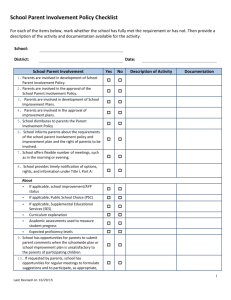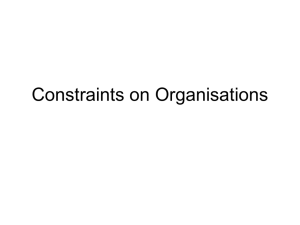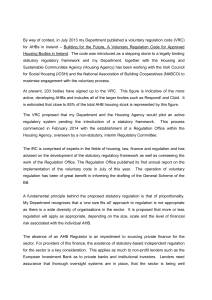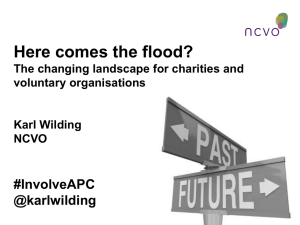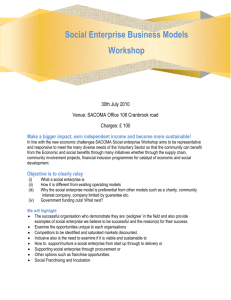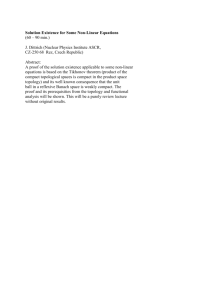braintree district local compact - Braintree District Voluntary Support
advertisement
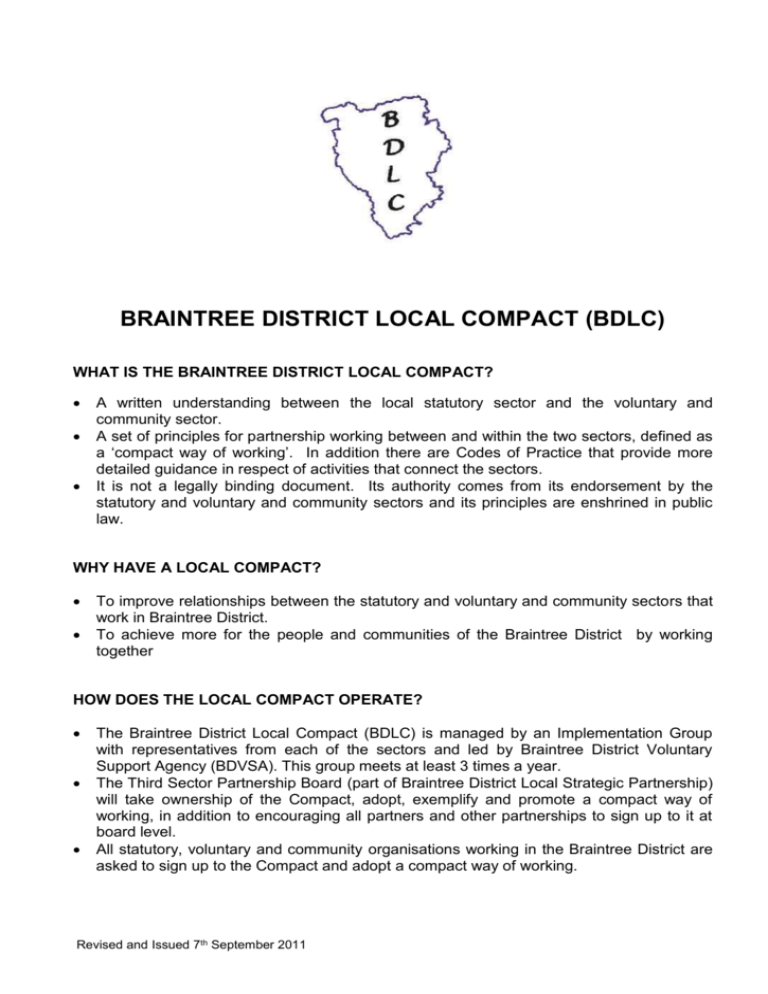
BRAINTREE DISTRICT LOCAL COMPACT (BDLC) WHAT IS THE BRAINTREE DISTRICT LOCAL COMPACT? A written understanding between the local statutory sector and the voluntary and community sector. A set of principles for partnership working between and within the two sectors, defined as a ‘compact way of working’. In addition there are Codes of Practice that provide more detailed guidance in respect of activities that connect the sectors. It is not a legally binding document. Its authority comes from its endorsement by the statutory and voluntary and community sectors and its principles are enshrined in public law. WHY HAVE A LOCAL COMPACT? To improve relationships between the statutory and voluntary and community sectors that work in Braintree District. To achieve more for the people and communities of the Braintree District by working together HOW DOES THE LOCAL COMPACT OPERATE? The Braintree District Local Compact (BDLC) is managed by an Implementation Group with representatives from each of the sectors and led by Braintree District Voluntary Support Agency (BDVSA). This group meets at least 3 times a year. The Third Sector Partnership Board (part of Braintree District Local Strategic Partnership) will take ownership of the Compact, adopt, exemplify and promote a compact way of working, in addition to encouraging all partners and other partnerships to sign up to it at board level. All statutory, voluntary and community organisations working in the Braintree District are asked to sign up to the Compact and adopt a compact way of working. Revised and Issued 7th September 2011 HOW DOES THE LOCAL COMPACT RELATE TO COUNTY AND NATIONAL COMPACTS? Compacts exist at local, county and national level and all share the same basic principles and aims. Relevant Compact Braintree District Local Compact www.bdvsa.org.uk Essex Compact www.essex.gov.uk National Compact www.thecompact.org.uk/ Level of Partnership Working Partnerships at District Level eg with Braintree District Council Partnerships at County level eg with Essex County Council Partnerships at National level eg with national government HOW IS THE LOCAL COMPACT MONITORED AND REVIEWED? The Third Sector Partnership Board records ‘Wins & Losses’. Organisations are asked to report successes and problems in using the Compact and its Codes of Practice to The Third Sector Partnership Board. There will be an annual review of the Braintree District Local Compact by The Third Sector Partnership Board. This will enable all statutory, voluntary and community organisations to find out how the Compact is working and how it has been used. A report of the review will be published. OUTCOMES The Compact will help achieve the following outcomes when the statutory sector and the voluntary and community sector work together: INDEPENDENCE OPENNESS AND ACCOUNTABILITY QUALITY FAIRNESS Shared principles as well as undertakings by each of the sectors are identified under each outcome heading. In addition, to help achieve these outcomes, the following Codes of Practice set out good practice guidelines: Community Engagement Funding and Procurement Volunteering Revised and Issued 7th September 2011 Independence Shared principles To recognise that voluntary and community organisations are entitled to campaign in order to advance their aims and objectives, to comment on public sector policy, to challenge policy, and to determine and manage their own affairs irrespective of any funding or partnership relationships,. Undertakings by the statutory sector To recognise the diversity of the voluntary and community sector in Braintree District. This includes a wide variety of individual organisations, from small groups run entirely by volunteers to large charities and community enterprises with paid staff. To respect and uphold the independence of the voluntary and community sector. To acknowledge that the VCS have a campaigning role which may conflict with statutory policies plans and decisions. Undertakings by the voluntary and community sector To respect the confidentiality of information from statutory agencies. Relevant Codes of Practice: Funding and Procurement Code of Good Practice Revised and Issued 7th September 2011 Openness and accountability Shared principles To recognise that the statutory and voluntary and community sectors have different forms of accountability and are answerable to different stakeholders. Common to both is the need for integrity, equality, objectivity, accountability, openness, understanding, honesty and leadership. Undertakings by the statutory sector To recognise the need for consistency and transparency in funding frameworks. To consult and work with the voluntary and community sector from the earliest possible stage, subject to external requirements and sensitivity, on the design of policies, programmes and services To give early notice of forthcoming consultations with a 12 week response period for written consultations. If this cannot be adhered to, the reasons for this must be stated at the time of the consultation. To ensure that whenever possible decisions and findings are made public To draw up a diary of major consultations which are planned for each year and publicise it. Undertakings by the voluntary and community sector To maintain high standards of governance, management and conduct and meet agreed reporting and accountability obligations to funders and users. To recognise that statutory agencies are accountable for the use of public money, including that used to fund voluntary or community organisations. To recognise that funding needs to fall within service priority areas and that the statutory sector are bound by the requirements of their corporate governance. To respect and be accountable to the law and, in the case of charities, to observe the appropriate guidance from the Charity Commission, including that on political activities and campaigning. To promote and respond to consultations where appropriate. To seek the views of service users, clients, beneficiaries, members, volunteers and trustees when making representation to statutory organisations. Being clear on who is being represented, in what capacity, and on what basis that representation is being made. To focus on evidence-based solutions, with clear proposals for positive outcomes when putting forward ideas. Relevant Codes of Practice: Community Engagement Code of Good Practice Funding and Procurement Code of Good Practice Revised and Issued 7th September 2011 Quality Shared principles To recognise that meaningful engagement builds relationships, improves policy development and enhances the design and delivery of services and programmes. To ensure that partnership working has common aims, avoids duplication, complements each other’s services and brings added value. To achieve more by sharing resources, information, specialist knowledge and skills. Undertakings by the statutory sector To recognise the value of long-term, multi-year funding, where appropriate, to assist longer term planning, stability and sustainability of services provided by the voluntary and community sector. To recognise the importance of infrastructure to the voluntary and community sector and volunteering. To encourage feedback from a range of sources on the effectiveness of statutory sector practices and processes To provide information and training to the VCS on consultation processes and any other ways by which they can influence policy. Undertakings by the voluntary and community sector To involve service users, volunteers, members and supporters wherever possible, in the development and management of activities and services. To demonstrate the social, environmental and economic value of programmes and services provided, where appropriate. To apply quality standards appropriate to the organisation. Relevant Codes of Practice: Community Engagement Code of Good Practice Funding and Procurement Code of Good Practice Volunteering Code of Good Practice Revised and Issued 7th September 2011 Fairness Shared principles To recognise that there is equal value in the contribution from organisations regardless of their size. To value and celebrate the diversity of the people and communities in Braintree District. and to promote and strive for equality of opportunity regardless of age, disability, gender, race, religion, belief or sexual orientation. To take practical action to eliminate unlawful discrimination, advance equality and to ensure a voice for under-represented and disadvantaged groups Undertakings by the statutory sector To recognise the need for fairness and equality of access to opportunities, To assess the impact of changes in policies and procedures on the voluntary and community sector at an early stage of development To recognise that some voluntary and community groups have specific needs, interests and contributions to make as a result of the client group that they represent. To work towards limiting barriers to volunteering and community action presented by existing policies and practices To aim to increase staff awareness of volunteer contributions to local initiatives Undertakings by the voluntary and community sector To put in place policies for promoting best practice and equality of opportunity in activities, employment, involvement of volunteers and service provision. Relevant Codes of Practice: Community Engagement Code of Good Practice Funding and Procurement Code of Good Practice Volunteering Code of Good Practice Revised and Issued 7th September 2011 Resolution of disagreements The Braintree District Local Compact (BDLC) sets out a general framework for enhancing the relationship between the statutory sector and the voluntary and community sector. As far as possible, disagreements over the application of this framework should be resolved between the parties. Where resolution is not possible, both parties should seek mediation, through a mutually agreed mediator. BDLC has published a Resolution of Disagreements which is available at www.bdvsa.org.uk to be used if a disagreement arises. Signatories Since its inauguration all voluntary, community and statutory organisations have been encouraged to join the Compact and sign up to it individually. To sign a declaration on behalf of an organisation please visit www.bdvsa.org.uk, complete and submit the signatory form. Existing signatories will be asked to comply with this revised Compact and continue to be recognised as a signatory unless they request otherwise. Voluntary and community sector organisations who are members of Braintree District Voluntary Support Agency will be expected to comply with the revised Compact and be recognised as a signatory unless they request otherwise. Published on behalf of the Braintree District Local Compact Implementation Group Working as part of the Braintree District Third Sector Partnership This document is also available in alternative formatsIf you require additional copies or further information then please contact: Rachel Fahie BDVSA, Room 5, Colne House Coggeshall Rd, Braintree CM7 9BY Tel 01376 550507 Fax 01376 550092 e-mail: ceo@bdvsa.org Revised and Issued 7th September 2011
